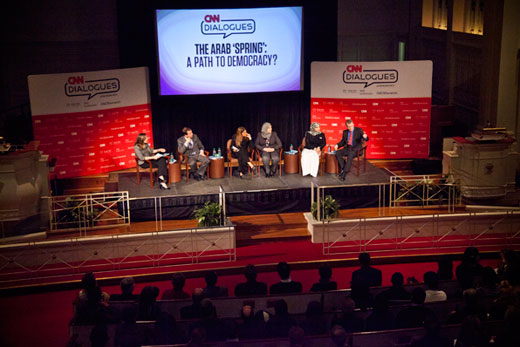CNN Dialogues, a colloquium devoted to addressing major domestic and international issues, held its fourth event at Glenn Memorial Auditorium on Feb. 9 titled "The 'Arab Spring': A Path to Democracy?" CNN International anchor and correspondent Hala Gorani served as moderator.
Panelists included Ahed Al Hendi, an activist and Arabic programs coordinator at CyberDissidents; Carrie Wickham, associate professor of political science at Emory; Lamees Dhaif, a Bahraini journalist whose writing was banned by the Bahraini government because of her participation in the opposition movement there; Nic Robertson, senior CNN international correspondent who has reported extensive coverage from inside the Arab nations; and Dalia Ziada, activist and director of the American Islamic Congress in Egypt.
Gorani began the discussion by posing the question, "Where are we headed in the Middle East today?" Later she asked, "Who is winning and who is losing in the Middle East?"
She explained how a revolution that started as a Tunisian street protest has spread to other Arab nations and how it has not only altered the political landscape in those countries but also left them in a vulnerable state today.
Ziada said that despite a new dictatorship being born in Egypt, the revolution has been worth it. She noted, however, that only eight women ran for Parliament in Egypt in the last election out of 508 possible seats. Ziada herself unsuccessfully ran for office in Egypt.
She also said that the winners are the people who broke the barriers of fear.
Because Bahrain is an important U.S. ally, there appears to be a double standard in terms of what is going on in that region, according to Dhaif.
Dhaif urged that increasing U.S. support and intervention in the country would benefit it.
To make it in Syria, you have to have friends in the regime, said Al Hendi, a dissident who fled Syria years ago.
Syria's best bet is to "get some dialogue going," said Robertson, who reported as recently as three weeks ago from the nation. Robertson mentioned, however, that while that is the very best scenario, it may not be the most likely option.
Wickham analyzed the economic ramifications of the revolution and explained how in Arab nations, economic corruption and mismanagement thrive.
Economic recovery is vital for the stability of a country, she said.
Wickham also said that a staggering proportion of Egyptians live on less than $2 a day and that unemployment, and underemployment are high there.
Despite the current state of affairs in these nations, all of the panelists expressed optimism on the future of the Arab nations.
"Believe in us, support us," said Dhaif.
"We are all universal citizens and we belong to the same human family," Ziada explained.
"We'll reach the free world that we dream of," she said.
Audience members tweeted their reactions throughout the event using the hashtag "#CNNDialogues."
CNN Dialogues is made possible by the partnership of CNN, Emory's James Weldon Johnson Institute for the Study for Race and Difference and the National Center for Civil and Human Rights.

